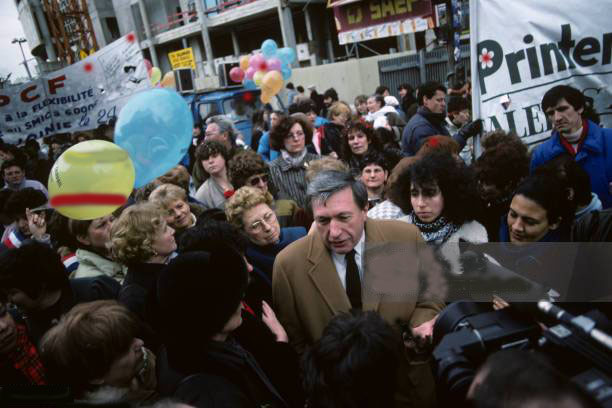Death of André Lajoinie, a Key Figure of the French Communist Party and 1988 Presidential Candidate
On November 26, 2024, André Lajoinie, a prominent leader of the French Communist Party (PCF) and former presidential candidate, passed away at the age of 94. A symbol of deep political commitment, he devoted his life to defending workers’ rights and advocating for social justice, embodying values of integrity and dedication.
A Humble Beginning and Early Activism
Born on December 26, 1929, in Chasteaux, Corrèze, into a modest farming family, André Lajoinie grew up with strong values of solidarity and community. Influenced by his father, who transitioned from radical socialism to communism, he developed an early interest in social and political struggles. He joined the Young Communists in 1946 and became a member of the French Communist Party in 1948, at just 19 years old.
Forced to leave school after earning his certificate of studies, Lajoinie worked on the family farm but maintained an insatiable thirst for knowledge. In 1958, during a protest against supporters of French Algeria, he was severely injured by police forces. This pivotal event further solidified his resolve to fight for justice and equality.
A Distinguished Political Career
Lajoinie became a member of the PCF’s Central Committee in 1976, joined the Political Bureau in 1979, and entered the Party Secretariat in 1982. He was renowned for his dedication to agricultural and social issues. Elected as a deputy from the Allier constituency in 1978, he served in this position until 2002 and led the communist group in the National Assembly from 1981 to 1993. Concurrently, he was a regional councilor in Auvergne from 1978 to 1988 and again from 1992 to 1998.
Presidential Candidate in 1988
In 1988, Lajoinie was nominated as the PCF’s presidential candidate, running in a challenging environment for the party. Campaigning under the slogan “No way we’ll back down!”, he encouraged workers to stand strong against social and economic challenges. Despite his passionate efforts and memorable speeches, he garnered only 6.78% of the vote, reflecting the PCF’s electoral decline during that period.
A Lasting Political and Social Legacy
Beyond elections, André Lajoinie left a significant mark on French politics through his numerous battles for workers’ welfare. He championed better living conditions, achieving progress such as increases in small agricultural pensions, support for education through back-to-school allowances, and measures to promote social housing.
Internationally, he was a staunch opponent of racism and anti-Semitism, contributing to the adoption of the Gayssot Law. He also played a pivotal role in supporting Nelson Mandela’s release and ending apartheid in South Africa.
A Humanitarian and Visionary Leader
Lajoinie was admired for his humanity and passion for dialogue. A lover of science and literature, he enriched his speeches and policies with intellectual curiosity. He remained steadfast in his principles while adapting to societal changes.
Widespread Tributes
His death has sparked widespread emotion and respect. Fabien Roussel, Secretary-General of the PCF, honored him as “a man of great humanity, a fierce defender of the working class, and a true patriot.” Parisian official Ian Brossat also praised Lajoinie, describing him as “a man with a profound love for people.”
To his wife, his son Laurent, his family, and his comrades, we extend our heartfelt condolences. André Lajoinie’s legacy will remain etched in the political and social history of France.
وفاة أندريه لاجواني، القائد التاريخي للحزب الشيوعي الفرنسي ومرشح الرئاسة لعام 1988
أُعلن يوم 26 نوفمبر 2024 عن وفاة أندريه لاجواني، أحد أبرز قادة الحزب الشيوعي الفرنسي، عن عمر ناهز 94 عامًا. يُعد لاجواني شخصية بارزة في المشهد السياسي الفرنسي، إذ كرّس حياته للدفاع عن حقوق العمال والمجتمعات الشعبية، وكان رمزًا للنزاهة والالتزام في الحياة السياسية
وُلد لاجواني في 26 ديسمبر 1929 في قرية صغيرة بمقاطعة كوريز لعائلة متواضعة تعمل في الزراعة . نشأ في كنف والده، الذي كان في البداية مؤيدًا للحركة الراديكالية الاشتراكية قبل أن يتحول إلى الشيوعية. ترك المدرسة مبكرًا بسبب الظروف الاقتصادية ليساعد عائلته، لكنه لم يتخلَ عن حلمه بالمعرفة. بدأ اهتمامه بالسياسة في سن صغيرة بعد تأثره بالأحداث الكبرى التي شهدتها فرنسا في ثلاثينيات القرن الماضي، مثل معارضة اتفاقية ميونيخ.
في عام 1946، انضم إلى الشبيبة الشيوعية ثم أصبح عضوًا في الحزب الشيوعي الفرنسي في 1948، ليبدأ رحلة نضال طويلة. تعرض لإصابة خطيرة خلال مظاهرة في 1958 ضد مؤيدي الجزائر الفرنسية، وهو الحدث الذي عزز إيمانه بضرورة العمل السياسي لتحقيق العدالة الاجتماعية بين فئات المجتمع.
